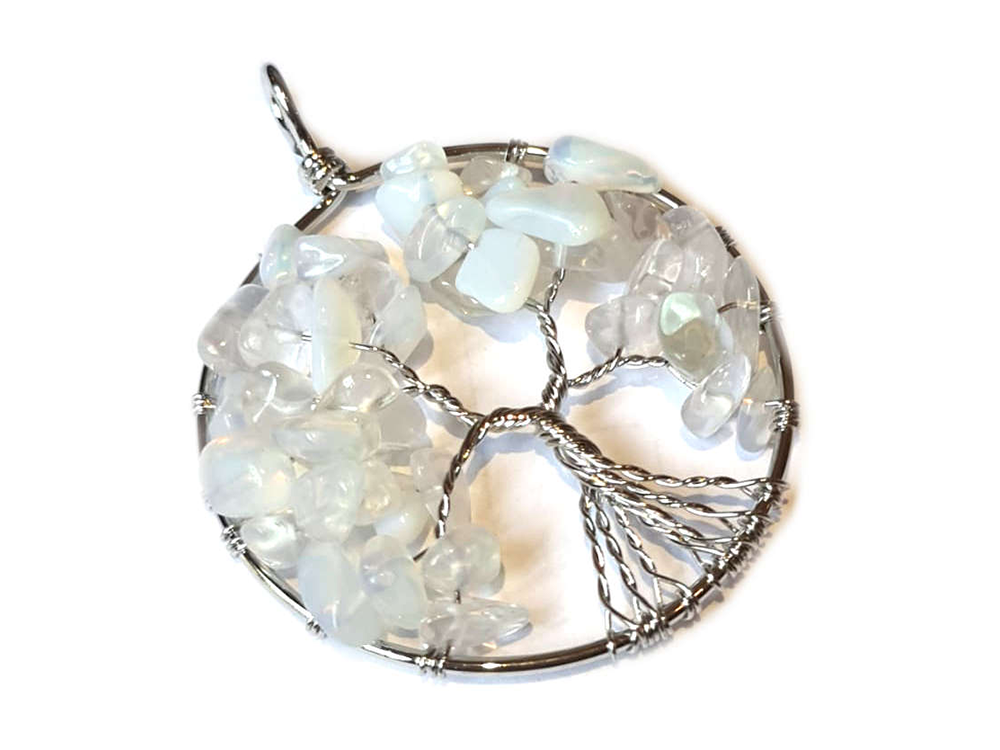Wildlings Crystal , Esoteric & Healing shop
OPAL TREE OF LIFE PENDANT - AMPLIFICATION
OPAL TREE OF LIFE PENDANT - AMPLIFICATION
Couldn't load pickup availability
OPALITE TREE OF LIFE PENDANT - AMPLIFICATION
The Gemstone of Amplification
- A stone of light, purity, and play
- Opal mining dates back to 400BC
- Has a high water content
Flashing in a thousand shimmering shades and with the dance of fire gleaming beneath its surface, the Opal stone is an enigma of light, purity, and mystical play. This gem is pure eye candy, with its spectral colors shining and its cool weight sitting in the palm of the hand. It’s a hugely amplifying stone and also known for its connection to fable and folklore.
Opal re-entered our modern world when it was found in Queensland Australia a century ago. A young boy who was out searching for gold and quartz with his father stumbled upon the shimmering delights and filled his sack with fistfuls of these fallen stars. The dream of collecting Opal tempted few men to battle the harsh elements of Australia’s backcountry, with Opal miners penning tales of desperation, extreme heat, thirst, stabbing bushlands and larger than life bugs. But Opal was such a precious prize to be won. Beyond the far corners of Australia, Opal is also mined in Mexico and Brazil.
But the Opal stone goes back further than this relatively recent discovery in Australia. The first notes of Opal mining can be traced back to the winding Carpathian Mountains in 400 BC and the gem was even penned into tales spun by the Ancient Greek Philosopher Plato. Roman Historian Pliny the Elder also talked about Opalus holding the garnet flame, the purple essence of amethyst, and the shimmering sea greens of emerald. It was a bewitching gem.
Opal fell out of favor a little later in life when Sir Walter Scott penned his 19th-century novel Anne of Geierstein. In these pages, his character Lady Hermione is said to have an Opal which ultimately leads to her demise and death. After this, the Opal had a spell of being seen as a gem of bad luck and the Opal market took a tumble as people stopped being enchanted by the iridescent precious opal and instead feared its dark powers. Queen Victoria shrugged off this superstition and instead gave her daughters Opals for their wedding day and slowly Opal became to be accepted as a sweet and hopeful gem again.
Opal is amorphous, meaning that it doesn’t have a crystalline structure but is instead classed as a mineraloid. It has high water content and is made from silicon dioxide and water. When water runs into the cracks and crevices of the earth, it collects silica sands along its journey. This forms silica spheres tightly packed together. Opal is storms and rain and the tears of the sky. It is softer than quartz and has a play of perfect color. Opal is definitely poetry in motion.
Opal is a mineral of amplification. It’s absorbent and reflective meaning that it collects thoughts and feelings turns up the dial and sends them back to you. This brings clarity, energy, and high vibrations which helps to call on the law of attraction.
SIZE: 6cm


